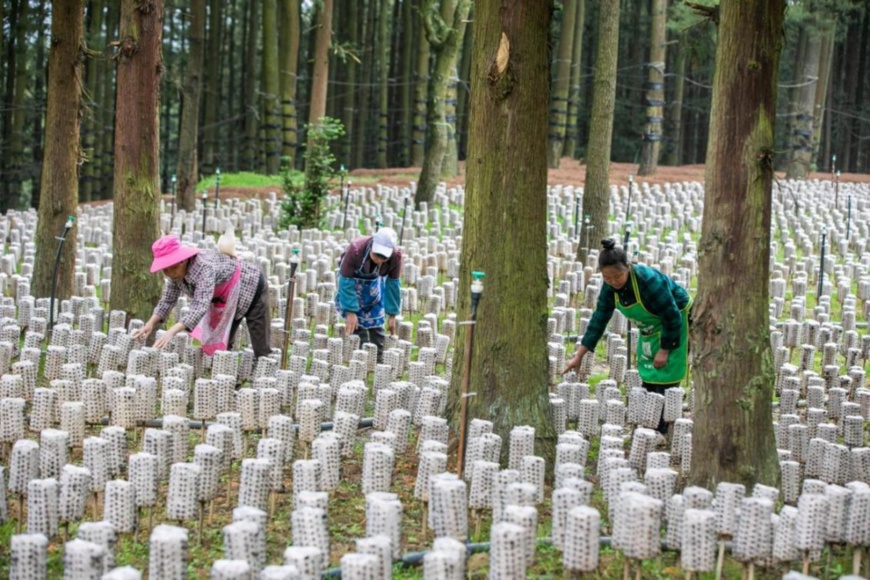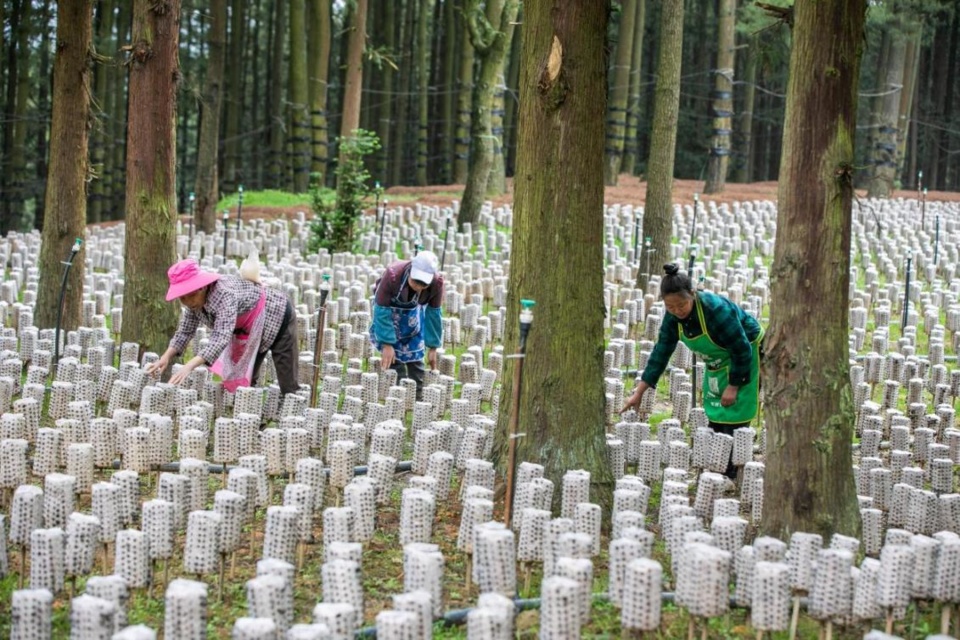By Chen Junyi, People's Daily

Villagers check the growth of agarics in an underwood farm in Huazuo township, Nayong county, Bijie, southwest China's Guizhou province, May 26, 2021. (Photo by Luo Dafu/People's Daily Online)
Guizhou province, located in southwest China, has a forest coverage rate of over 60 percent, and the province's forests are twice as large as its arable land.
Exploiting its forest resources, the province has vigorously developed the underwood economy, such as growing crops and livestock in the forests. These efforts have made the forestry sector more profitable, increased income for local farmers, and advanced green development, which is conducive to consolidating poverty alleviation achievements and initiating a dovetailing drive of rural vitalization.
Bamboo mushrooms are hailed as "the queen of fungi." The nutritious and delicious plant is commonly priced at 700 yuan per kilogram. Huazuo forest farm in Nayong county, Guizhou province, has established a 1,500-mu (100 hectares) plantation base for bamboo mushrooms, and the base has harvested 27.5 metric tons of bamboo mushrooms this year.
To the southeast of the bamboo mushroom plantation base, lies a free range chicken farm that keeps over 10,000 chickens. Zeng Lei, who's in charge of the chicken farm, told People's Daily that the farm, built in the woods, enjoys great vegetation and a sound environment, and the rich water resources there also make the farm a natural "habitat" for the chickens. Every time a batch of chickens are available for slaughter, the farm would be cleaned by its employees for the next batch to enter. The second batch of chickens this year have been sold to the Pearl River Delta.
In Baiyangping, Paomuzhai village of Liangshuijing township, Sinan county, dendrobium catenatums, an important traditional Chinese medicine, are grown on the trunks of many pine trees. According to Zhang Chengyuan, a total of 1,100 mu of dendrobium catenatums have been grown in the village and delivered 34.5 metric tons of products.
"Underwood economy exploits forestry resources and space in the forests, and enhances the protection of these resources. It is a win-win solution for ecology and economy," said Chen Gang, an official with the forestry bureau of Nayong county.
Regions in Guizhou have built four major industries around the underwood economy that match their own local conditions, including underwood planting, underwood husbandry, underwood fungus cultivation and eco-tourism.
Last year, 22.03 million mu of forestry in the province was used for underwood economy, generating a total output of 40 billion yuan ($6.26 billion). As of the end of June this year, Guizhou had built 321 underwood plantation and husbandry bases that cover more than 1,000 mu of forests, delivering half-year revenue of 29.57 billion yuan. The sector offered 106,600 stable jobs in 2020, effectively solving the employment problems for farmers during the pandemic. In the first six months of this year, underwood economy increased income for 3.2 million rural residents in Guizhou province.
Dafang county, located deep in the Wumeng Mountains in Guizhou's Bijie, is a perfect place for planting Gastrodia elat, an herbal medicine, due to its unique climate. According to Wen Ping, head of a local company producing the plant, the company joins over 20 exhibitions each year and has brought the plant to multiple coastal cities such as Guangzhou and Shanghai. "We invested over 800,000 yuan in exhibitions alone last year," Wen said.
In June this year, the company held an online promotion on a livestream platform. "We sold over 600,000 yuan of products in just some 20 minutes," Wen introduced, saying the company is planning to carry out long-term cooperation with influencers and livestream platforms.
At present, Dafang county is growing 30,000 mu of Gastrodia elat, and the business is bringing revenue of 180 million yuan to the county each year. The county has also built a standardized processing plant of Gastrodia elat, preliminarily establishing an industrial chain that covers the production, research, supply and distribution of Gastrodia elat.
Today, a series of geographical indication products have been approved in Guizhou province, which lays a solid foundation for the province's further development of underwood economy.
"We have built brands for our products, and it to some extent brings us reputation, expands our sales channels and improves our profits," said an official from the provincial forestry bureau of Guizhou, adding that the underwood economy of Guizhou is becoming increasingly competitive.
Exploiting its forest resources, the province has vigorously developed the underwood economy, such as growing crops and livestock in the forests. These efforts have made the forestry sector more profitable, increased income for local farmers, and advanced green development, which is conducive to consolidating poverty alleviation achievements and initiating a dovetailing drive of rural vitalization.
Bamboo mushrooms are hailed as "the queen of fungi." The nutritious and delicious plant is commonly priced at 700 yuan per kilogram. Huazuo forest farm in Nayong county, Guizhou province, has established a 1,500-mu (100 hectares) plantation base for bamboo mushrooms, and the base has harvested 27.5 metric tons of bamboo mushrooms this year.
To the southeast of the bamboo mushroom plantation base, lies a free range chicken farm that keeps over 10,000 chickens. Zeng Lei, who's in charge of the chicken farm, told People's Daily that the farm, built in the woods, enjoys great vegetation and a sound environment, and the rich water resources there also make the farm a natural "habitat" for the chickens. Every time a batch of chickens are available for slaughter, the farm would be cleaned by its employees for the next batch to enter. The second batch of chickens this year have been sold to the Pearl River Delta.
In Baiyangping, Paomuzhai village of Liangshuijing township, Sinan county, dendrobium catenatums, an important traditional Chinese medicine, are grown on the trunks of many pine trees. According to Zhang Chengyuan, a total of 1,100 mu of dendrobium catenatums have been grown in the village and delivered 34.5 metric tons of products.
"Underwood economy exploits forestry resources and space in the forests, and enhances the protection of these resources. It is a win-win solution for ecology and economy," said Chen Gang, an official with the forestry bureau of Nayong county.
Regions in Guizhou have built four major industries around the underwood economy that match their own local conditions, including underwood planting, underwood husbandry, underwood fungus cultivation and eco-tourism.
Last year, 22.03 million mu of forestry in the province was used for underwood economy, generating a total output of 40 billion yuan ($6.26 billion). As of the end of June this year, Guizhou had built 321 underwood plantation and husbandry bases that cover more than 1,000 mu of forests, delivering half-year revenue of 29.57 billion yuan. The sector offered 106,600 stable jobs in 2020, effectively solving the employment problems for farmers during the pandemic. In the first six months of this year, underwood economy increased income for 3.2 million rural residents in Guizhou province.
Dafang county, located deep in the Wumeng Mountains in Guizhou's Bijie, is a perfect place for planting Gastrodia elat, an herbal medicine, due to its unique climate. According to Wen Ping, head of a local company producing the plant, the company joins over 20 exhibitions each year and has brought the plant to multiple coastal cities such as Guangzhou and Shanghai. "We invested over 800,000 yuan in exhibitions alone last year," Wen said.
In June this year, the company held an online promotion on a livestream platform. "We sold over 600,000 yuan of products in just some 20 minutes," Wen introduced, saying the company is planning to carry out long-term cooperation with influencers and livestream platforms.
At present, Dafang county is growing 30,000 mu of Gastrodia elat, and the business is bringing revenue of 180 million yuan to the county each year. The county has also built a standardized processing plant of Gastrodia elat, preliminarily establishing an industrial chain that covers the production, research, supply and distribution of Gastrodia elat.
Today, a series of geographical indication products have been approved in Guizhou province, which lays a solid foundation for the province's further development of underwood economy.
"We have built brands for our products, and it to some extent brings us reputation, expands our sales channels and improves our profits," said an official from the provincial forestry bureau of Guizhou, adding that the underwood economy of Guizhou is becoming increasingly competitive.
 Menu
Menu
 Guizhou province turns green forests into invaluable assets
Guizhou province turns green forests into invaluable assets
















